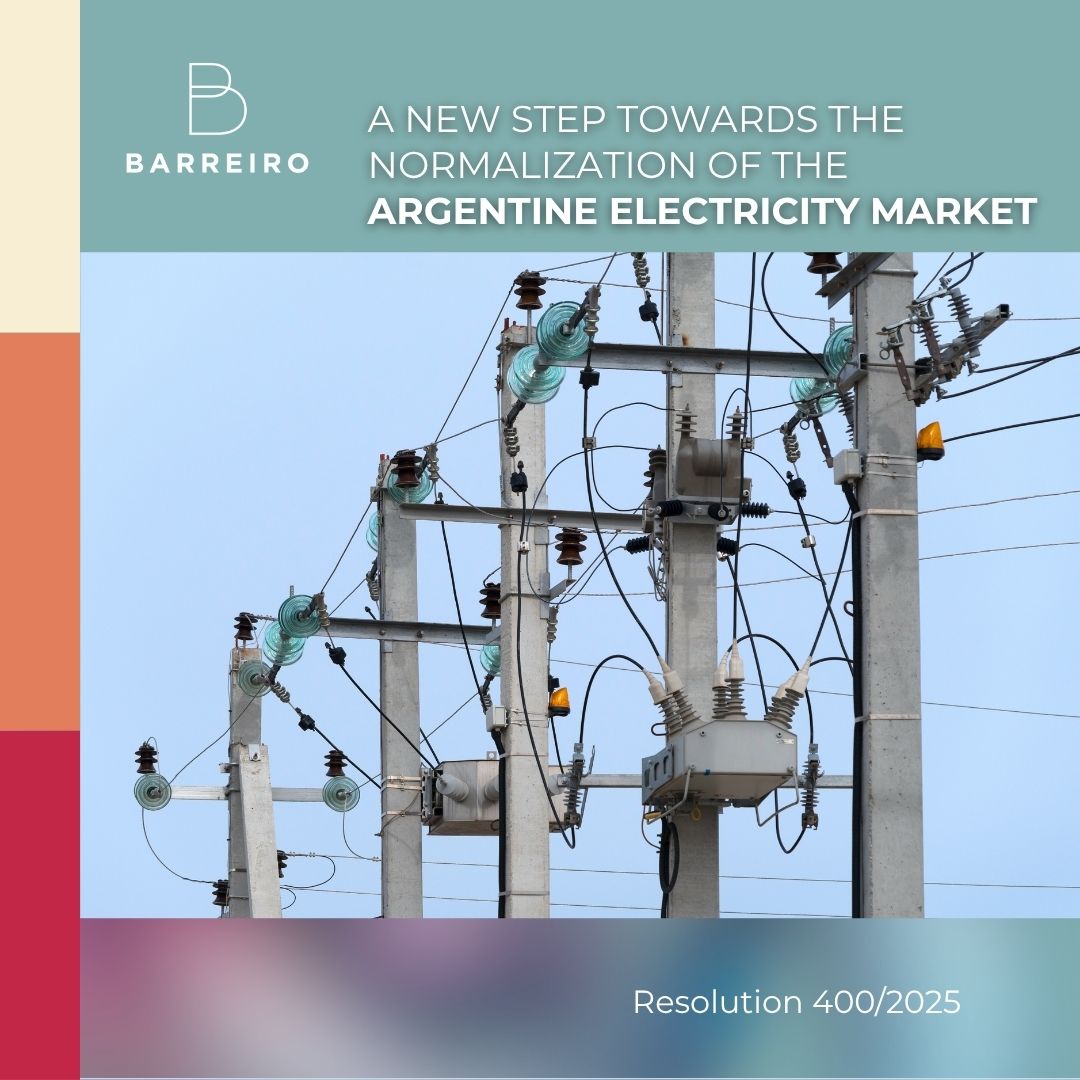A new step towards the normalization of the Argentine electricity market
 Resolution 400/2025: The Secretariat of Energy Takes a Key Step Toward the Normalization of the Wholesale Electricity Market
Resolution 400/2025: The Secretariat of Energy Takes a Key Step Toward the Normalization of the Wholesale Electricity Market
On October 20, 2025, the Secretariat of Energy, under the Ministry of Economy, issued Resolution 400/2025, approving the new “Rules for the Normalization of the Wholesale Electricity Market (MEM) and Its Progressive Adaptation”, which will come into effect on November 1, 2025.
This measure represents a regulatory milestone in the process of rebuilding the MEM, aiming to restore competition, transparency, and economic efficiency in the operation of Argentina’s electricity system.
Core Objectives of the Resolution
The regulation is part of the regulatory transition process established by Decree 450/2025, and seeks to advance toward a more competitive, self-sufficient, and predictable electricity market, with clear rules for both supply and demand.
Its main goals include:
-
Promoting free contracting of energy and fuels by generators and distributors.
-
Ensuring contract enforceability and the financial sustainability of the system.
-
Encouraging efficiency and competition in thermal generation.
-
Fostering private investment in generation and transmission.
-
Reducing implicit subsidies through transparent cost allocation.
Key Updates in the New MEM Framework
Market Reconfiguration and Demand Classification
Three demand categories are established:
-
Large Distribution Users (GUDI): consumers over 300 kW, allowed to freely contract their supply.
-
Residential and Non-Residential Demand: supplied through seasonal prices and regulated contracts.
New Generation Categories
The resolution introduces a differentiated classification:
-
Assigned Generation: units with existing contracts or under state control, designated to cover seasonalized demand.
-
Spot Generation: plants without prior contracts, enabled to participate in the competitive market and enter into bilateral agreements.
-
New Generation: any facility with commercial operation authorization after January 1, 2025, eligible for specific incentives.
Fuel Management and Price Formation
A new fuel management framework is approved, decentralizing procurement and allowing for more representative marginal cost signals.
Additionally, a new pricing system for energy and capacity is introduced to reflect real costs and improve operational efficiency.
Reliability Reserve Services
Two essential services are created to ensure system stability:
-
Base SRC: aimed at existing thermal generation, with compensation of USD 1,000 per MW-month available.
-
Additional SRC: applicable to new generation (thermal, hydro, nuclear, or storage), with compensation of USD 9,000 per MW-month, for up to 10 years.
These mechanisms are designed to ensure availability, operational backup, and stimulate new investments.
New Regime for Extra-Trend Demand
Any new demand directly connected to the transmission system and exceeding 0.5% of the national average consumption must prove new generation sources and physical backup covering at least 80% of its consumption.
Transparency and Economic Predictability
The new framework redefines the cost recovery scheme for MEM services, setting explicit prices and objective methodologies.
It also establishes the BCRA wholesale dollar rate (Communication “A” 3500) as a reference for conversions and updates the exchange rate criteria applicable to variable charges, capacity, and services.
These measures aim to streamline system accounting, reduce distortions, and provide greater financial predictability for CAMMESA, generators, and distributors.
Free Contracting and Renewable Energy
The resolution removes restrictions on distributors contracting within the Renewable Energy Term Market (MATER), opening the door to new direct agreements with generators and self-generators.
This will enable progress toward a more diversified and competitive energy matrix, with increased private sector participation.
In Summary
Resolution 400/2025 marks a turning point in Argentina’s energy policy, aimed at restoring a more competitive, sustainable, and transparent electricity market.
Its progressive implementation, starting in November 2025, represents a firm step toward the normalization of the MEM, aligning prices, investment, and operations with international standards of efficiency and predictability.